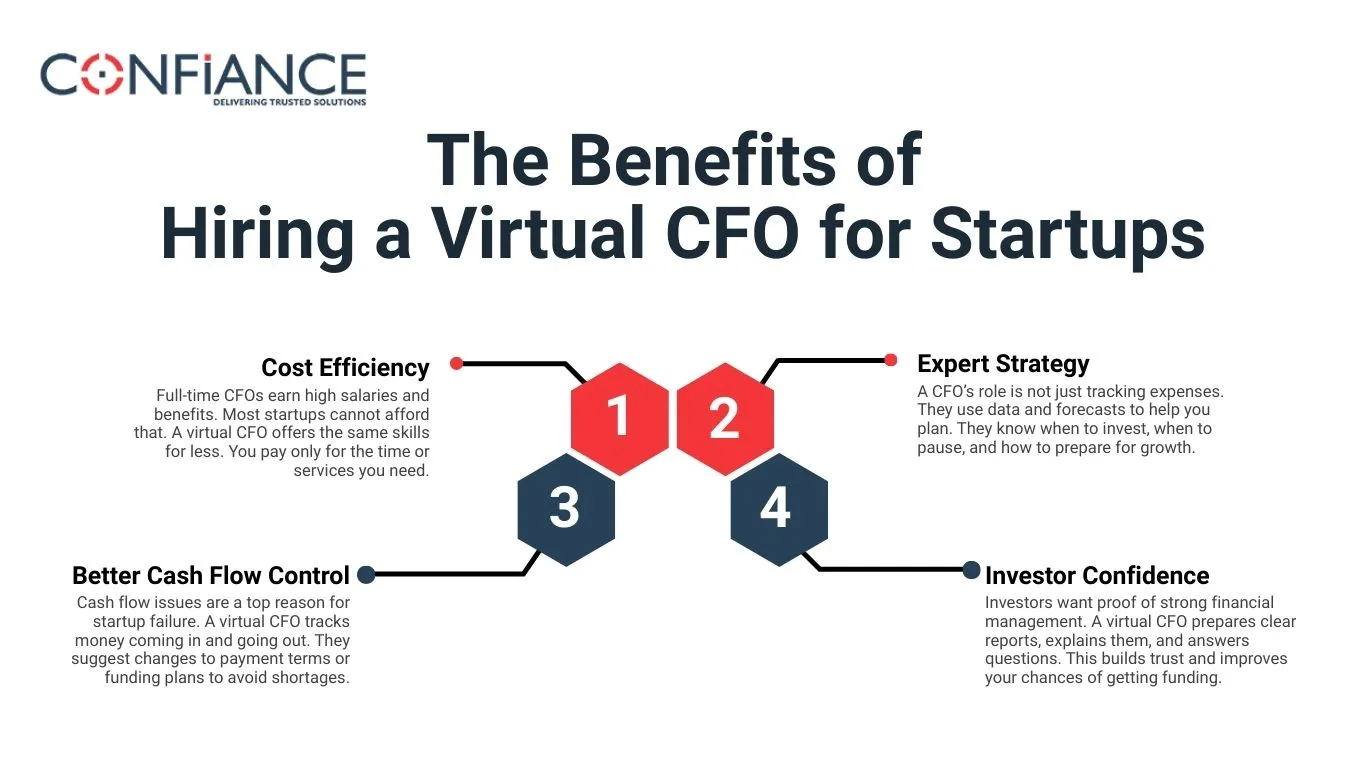
Impact of Hiring a Virtual CFO for Startups
Starting a business is exciting, but the early stages can be stressful. Many founders spend most of their time on product design, sales, and brand building. Finance often gets less focus than it should. Without strong financial control, even the most promising ideas can run into trouble. Hiring a virtual CFO for startups changes that.
You get the skills of a chief financial officer without paying for a full-time role. This means you gain expert advice while keeping your budget in check. In this blog, we look at how a virtual CFO affects startups, why they matter, and what to expect when working with one.
What Is a Virtual CFO?
A chief financial officer handles the financial strategy of a company. They manage budgets, oversee cash flow, prepare reports, and plan for the future. In larger firms, the CFO is part of the core leadership team.
A virtual CFO does the same work but operates remotely. They may work part-time or on a project basis. This makes them a good fit for startups that cannot yet afford a full-time CFO but still need high-level guidance.
When you hire a virtual CFO for startups, you get access to the same insight larger companies enjoy. They act as an advisor, planner, and problem-solver for your finances.
Why Startups Need Financial Expertise Early
Most startups begin with limited funds. Many founders manage their own books or hand the work to a junior team member. While this may be fine for basic records, it often falls short for deeper planning and control.
Without expert input, startups may face:
- Unclear revenue targets
- Poor cash flow control
- Weak cost management
- Missed tax planning opportunities
- Low investor appeal
These gaps can slow growth or lead to failure. A virtual CFO for startups fixes these issues by setting up proper systems from the start.
The Benefits of Hiring a Virtual CFO for Startups
- Cost Efficiency
Full-time CFOs earn high salaries and benefits. Most startups cannot afford that. A virtual CFO offers the same skills for less. You pay only for the time or services you need. - Expert Strategy
A CFO’s role is not just tracking expenses. They use data and forecasts to help you plan. They know when to invest, when to pause, and how to prepare for growth. - Better Cash Flow Control
Cash flow issues are a top reason for startup failure. A virtual CFO tracks money coming in and going out. They suggest changes to payment terms or funding plans to avoid shortages. - Investor Confidence
Investors want proof of strong financial management. A virtual CFO prepares clear reports, explains them, and answers questions. This builds trust and improves your chances of getting funding.

How a Virtual CFO Works With Startups
Step 1: Initial Review
They check your financial records, income streams, expenses, and systems.
Step 2: Setting Goals
They work with you to set short-term and long-term targets, such as revenue milestones or investor readiness.
Step 3: Building Systems
They install tools for budgeting, reporting, and compliance. This may include accounting software, dashboards, and approval steps.
Step 4: Ongoing Monitoring
They track results, adjust plans, and update you. They join key meetings and guide decision-making.
Key Services Provided by a Virtual CFO
A virtual CFO for startups can provide:
- Budget setup and tracking
- Cash flow forecasting
- Pricing and profit analysis
- Reports for investors
- Tax planning and compliance
- Funding support and pitch prep
- Risk analysis and contingency planning
You can choose only the services that match your current needs.
Cash Flow Management in Detail
Cash flow is the lifeline of your business. Even strong sales cannot save you from poor cash control. A virtual CFO helps you track available cash, incoming funds, and outgoing costs.
They can:
- Shorten payment cycles
- Negotiate better terms with suppliers
- Find and cut wasteful expenses
- Plan for seasonal changes
Accurate forecasts reduce last-minute cash problems.
Supporting Fundraising Efforts
If your startup wants investment, a virtual CFO for startups can make the process smoother.
They help by:
- Preparing credible projections
- Finding the right funding amount for your needs
- Advising on the best time to raise funds
- Joining investor meetings to handle finance questions
- Explaining numbers in simple terms
This preparation makes you look professional and builds investor trust.
Risk Management and Planning
Startups face risks from market shifts to supply issues. A virtual CFO spots them early and prepares for them.
Their work includes:
- Assessing threats to income and costs
- Building strategies to reduce risks
- Creating “what-if” plans for possible problems
- Keeping a clear action plan ready
Example: They might plan for a 20% sales drop or late payments from a key client.
Technology Setup and Integration
A virtual CFO for startups makes sure your financial tools are up to date.
They:
- Recommend the right accounting and reporting software
- Ensure systems are accurate and secure
- Automate tasks like invoicing and expense tracking
- Train your team to use new tools
This saves time and reduces errors.
Growth and Scaling Support
As your startup expands, your financial needs grow. A virtual CFO can:
- Advise on when to hire
- Guide market or location expansion
- Track results using key metrics
- Adjust plans to keep growth profitable
This ensures growth adds value instead of draining your resources.
Flexibility for Changing Needs
Startups often shift focus quickly. A virtual CFO adapts, whether you need:
- Fast cost cuts
- A funding plan
- A budget reset
Their work with different industries means they bring ideas you may not have considered.
Training Founders in Finance
Many founders are skilled in tech, marketing, or design, but not finance. A virtual CFO for startups can:
- Teach you to read reports
- Explain key ratios
- Show how to use data for decisions
This training builds confidence and reduces reliance on outside advice.
Long-Term Impact on a Startup
Over time, a virtual CFO can build:
- A stronger financial base
- Better investor appeal
- Reduced risks
- Steady, sustainable growth
Startups that invest in this early tend to last longer and grow faster.
Common Misconceptions
- “They’re only for large companies” – Small startups benefit too.
- “They only handle accounting” – They also manage strategy, risk, and growth.
- “Remote means disconnected” – Regular updates keep them engaged.
Hiring a virtual CFO for startups is a cost-effective way to get top-level financial skills. At Confiance, we offer virtual CFO services for startups. Our CFOs guide you a strategy, protect cash flow, improve reporting, and prepare you for growth. This lets your founders spend more time building the business, knowing the finances are in safe hands.
FAQs
- What is a virtual CFO and how does it differ from an in house CFO?
A virtual CFO works remotely and delivers senior finance leadership on a part time basis. - When should a startup hire a virtual CFO?
Hire one when cash flow is tight, when funding is planned, or when financial reports are unclear. - How does a virtual CFO reduce costs for a startup?
They remove the need for a full time salary and steer spend toward the most useful items. - Will a virtual CFO help with fundraising?
Yes; they build clear forecasts, set funding targets, and present numbers to investors. - What core services do virtual CFOs provide?
They set budgets, forecast cash, measure profit, prepare investor reports, and advise on tax and funding. - How does a virtual CFO improve cash flow?
They speed up invoicing, negotiate better terms, cut waste, and plan for slow seasons. - Will a remote CFO stay engaged with my team?
They join key meetings, give regular reports, and train founders to use financial data. - How should a startup measure the impact of a virtual CFO?
Track cash runway, profit margins, budget variance, and the pace of investor commitments.
